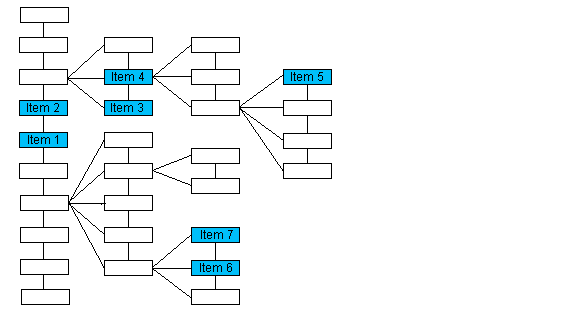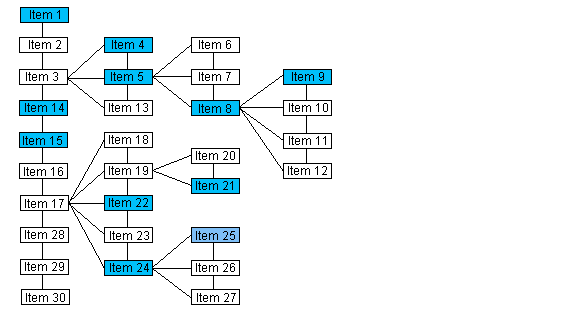GetPreviousElement Method
public DicomElement GetPreviousElement(DicomElement element,bool tree,bool includeVolatile)
- (nullable LTDicomElement *)previousElement:(LTDicomElement *)element tree:(BOOL)tree includeVolatile:(BOOL)includeVolatile; public DicomElement getPreviousElement(DicomElement element, boolean tree, boolean includeVolatile) public:DicomElement^ GetPreviousElement(DicomElement^ element,bool tree,bool includeVolatile)
Parameters
element
An item in the Data Set. The item in the Data Set that immediately precedes this item will be returned.
tree
true to evaluate the Data Set as a tree; false to evaluate the Data Set as a list.
includeVolatile
true to retrieve the previous element, volatile or non-volatile; false to retrieve the previous non-volatile element.
Return Value
The item in the Data Set that immediately precedes the item specified by element, or a null reference (Nothing in VB) if there is no item preceding element (element is the first item in the Data Set).
If the Data Set is evaluated as a tree structure, this method returns the previous item on the same level as element with the same parent as element. Please note that the numbering of the items in the following illustration is arbitrary and does not imply order.

| If the passed object points to: | The method returns an object pointing to: |
|---|---|
| Item 1 | Item 2 |
| Item 3 | Item 4 |
| Item 5 | null |
| Item 6 | Item 7 |
If the Data Set is evaluated as a list, the previous item in the list is returned. Please note that the numbering of the items in the following illustration does indicate the order of the items when the Data Set is evaluated as a list.

| If the passed object points to: | The method returns an object pointing to: |
|---|---|
| Item 1 | null |
| Item 15 | Item 14 |
| Item 5 | Item 4 |
| Item 9 | Item 8 |
| Item 22 | Item 21 |
| Item 25 | Item 24 |
The following methods will also help you navigate the Data Set as either a tree or a list:
If you evaluate the Data Set as a tree, you can also use the following methods to navigate the tree:
A volatile element is an element that can be changed or destroyed in the process of inserting or setting an image. A non-volatile element is an element that must be changed manually. It is not changed or destroyed by inserting or setting an image.
For example, a grayscale image has elements DicomTag.SmallestImagePixelValue, DicomTag.LargestImagePixelValue, etc. If the image is changed to a color image, these elements disappear and the following elements appear: DicomTagType.RedPaletteColorLookupTableDescriptor, etc. These are volatile elements since they are changed or destroyed when an image is changed or set.
To retrieve a previous element that must be changed manually, i.e., is not volatile, set includeVolatile to false. To retrieve the first element, either volatile or non-volatile, set includeVolatile to true.
using Leadtools;using Leadtools.Dicom;public void LoadEnumerateSample(){string dicomFileName = Path.Combine(LEAD_VARS.ImagesDir, "DICOM", "image3.dcm");//Make sure to initialize the DICOM engine, this needs to be done only once//In the whole applicationDicomEngine.Startup();using (DicomDataSet ds = new DicomDataSet()){//Load DICOM Fileds.Load(dicomFileName, DicomDataSetLoadFlags.None);//Insert patient name element, if it doesn't already existDicomElement element = ds.FindFirstElement(null, DicomTag.PatientName, false);if (element == null){element = ds.InsertElement(null, false, DicomTag.PatientName, DicomVRType.PN, false, 0);}//The dataset should include the patient name element or an error occurredelement = ds.FindLastElement(null, DicomTag.PatientName, false);Debug.Assert(element != null);//There can be only one patient element in the root levelelement = ds.FindPreviousElement(null, false);Debug.Assert(element == null);element = ds.FindNextElement(null, false);Debug.Assert(element == null);element = ds.FindFirstElement(null, DicomTag.PatientName, false);//Since the patient name element is in the root level,//GetRootElement will return the same element.DicomElement element1 = ds.GetRootElement(element);Debug.Assert((element1.Tag == element.Tag), "GetRootElement should return same element");//Since the patient name element has no parent then GetParentElement will return nullelement1 = ds.GetParentElement(element);Debug.Assert(element1 == null, "GetParentElement should return null");//Since the patient name element has no children then GetChildElement will return nullelement1 = ds.GetChildElement(element, false);Debug.Assert(element1 == null, "GetChildElement should return null");element1 = ds.GetFirstElement(element, false, false);Debug.Assert(element1 != null, "GetFirstElement Can't return null in this case");element1 = ds.GetLastElement(element, false, false);Debug.Assert(element1 != null, "GetLastElement Can't return null in this case");element1 = ds.GetPreviousElement(element, false, true);DicomElement element2 = ds.GetNextElement(element, false, true);Debug.Assert(ds.GetElementLevel(element) == 0);Debug.Assert(ds.ExistsElement(element));Debug.Assert(ds.IsVolatileElement(element) == false);//Patient Name is not the only element in this levelDebug.Assert((element1 != null) && (element2 != null));//Delete the patient name elementds.DeleteElement(element);}DicomEngine.Shutdown();}static class LEAD_VARS{public const string ImagesDir = @"C:\LEADTOOLS23\Resources\Images";}
Reference
© 1991-2024 LEAD Technologies, Inc. All Rights Reserved.
